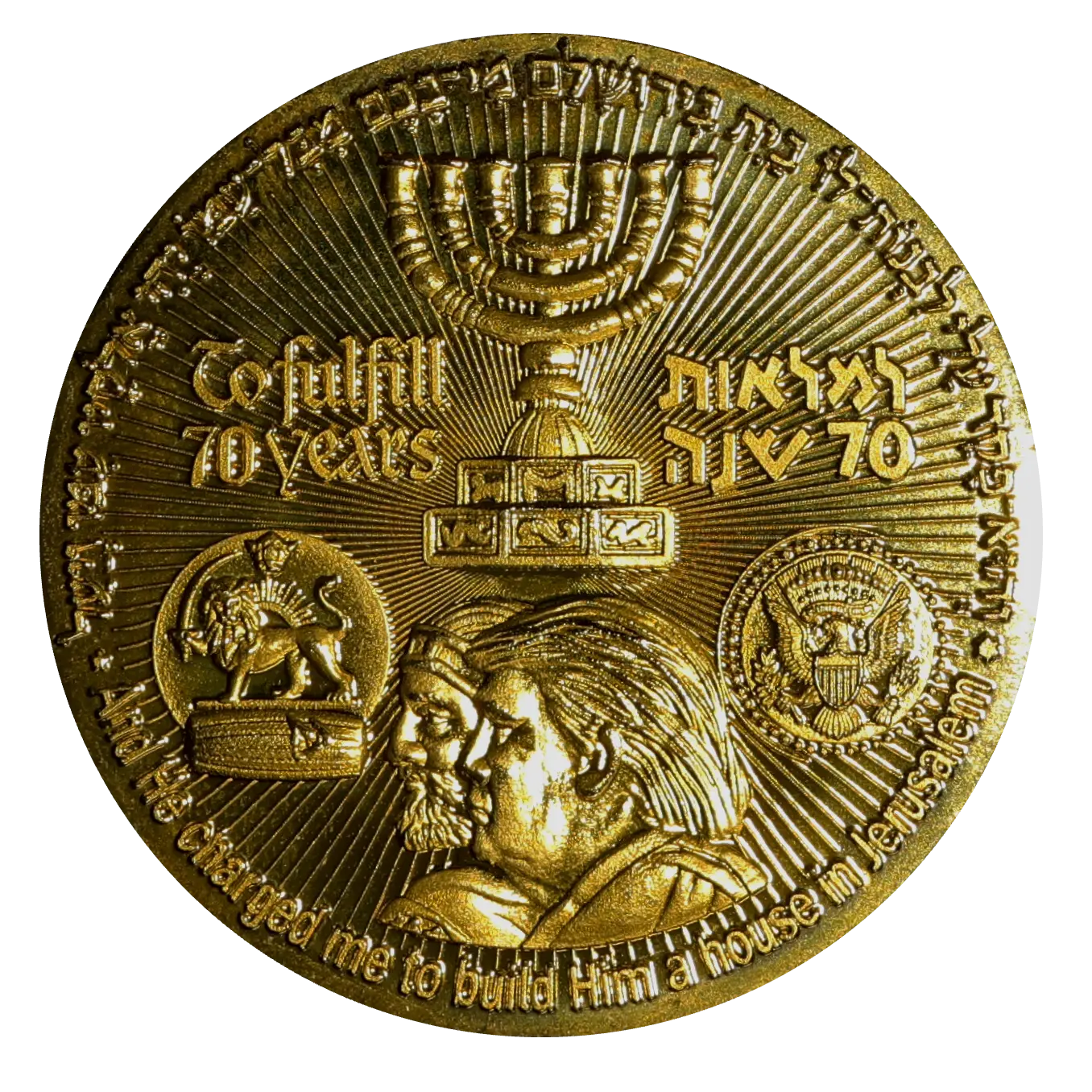Donald Trump as Messiah and King Cyrus
In the bible, the Persian king Cyrus is presented as a non-Jewish messianic figure, whom God has chosen to act in favor of the people of Israel. In reception history, kings and political leaders like Tsar Alexander II or Harry S. Truman were seen like Cyrus. The pattern of interpretation, however, changes with Donald Trump, who is regarded as God’s chosen Messiah doing good deeds primarily for America. In this way, evangelical circles use the biblical motif of Cyrus and functionalize it to promote Donald Trump despite his moral “deficits”, an interpretation which is becoming increasingly popular.
Table of Contents
1. Introduction
Donald Trump as God's chosen messiah—this is a motif that appeared in 2015 in the run-up to the U.S. presidential election.
Hundreds of texts, speeches, lectures, and sermons given since 2015 by charismatic preachers and representatives of the prosperity gospel from evangelical circles—such as Robert Jeffress, Franklin Graham, Jerry Falwell, Jr., Tony Perkins, Bryan Fischer etc.—increasingly show a messianic pattern applied to Donald Trump (cf. Barrett-Fox). The speakers argue that Saul, Solomon, David and other biblical figures who prevailed against the political establishment as political leaders were messianic kings anointed by God, even if their moral behavior sometimes left much to be desired. Early on, this argument was focused on the Persian king Cyrus (559–530 BCE), who is described in Isa 44:24-45:8 as God's anointed and his messiah.
In presenting Trump as such a biblical king and messiah, Cyrus is understood as a ruler who does not share the belief of God but is nonetheless understood as God’s chosen messiah. In this reading, it is crucial that Cyrus as God’s anointed ruler does not know the God of Israel at all and therefore cannot keep to his commandments and follow their ethical and moral standards. This biblically based argumentation of a messianic ruler enables Donald Trump to be integrated precisely into the values and norms of evangelical Christians. In this way, the leading evangelical preachers use the biblical motif of Cyrus as the Messiah chosen by God and functionalize it to promote Donald Trump in the social milieu of evangelical Christians, which is becoming increasingly popular.
2. Donald Trump as “God’s Chaos Candidate” (Lance Wallnau)
Lance Wallnau is an evangelical preacher and entrepreneur who presents himself on his website as a “strategist, futurist and compelling communicator” (Link). He is one of the earliest of Trump’s supporters who popularized the interpretation of Donald Trump as biblical messiah on various media channels. In his book God’s Chaos Candidate, published in 2016, he describes his “vocation story”, with which he is likely to have been highly effective in convincing many undecided voters from the evangelical groups. He describes his vocation as follows:I was updating some random social media activity when I ran across a simple PowerPoint showing Trump seated in the oval office with the words “Donald Trump, 45th President of the United States.” The image made a peculiar impression on my mind. I was dazed. Literally no one was thinking this would be a possibility but I was sensing that this was more than some random Facebook meme; it was a prophetic picture. It struck me the same way the “wrecking ball” word did. The Spirit impressed upon my mind “read Isaiah 45.”
To be honest, I didn't recall what the chapter was about. I opened a Bible and began to read “Thus sayeth the Lord to Cyrus whom I’ve anointed.” Cyrus, I thought? Who is he in relation to all this? I recalled that he was a heathen king who was indispensable to the protection of the Jews but was frankly confused as to what God was saying.
With 16 candidates running, many who were clear conservative evangelicals, why would God be talking about Cyrus? I quickly looked up the number of the next president. I confirmed that Barack Obama is number 44. The next president will indeed be number 45. I kept reading Isaiah 45 (Link).
3. King Cyrus as Messianic Model
In the biblical book of Isaiah, the Persian king Cyrus is presented as a messianic figure, whom God has chosen as his instrument, although the Persian king did not know the God of Israel. In Ezr 1:1–3, Cyrus is understood as the one who leads Judah back to Israel from captivity and rebuilds the temple. In reception history, the Persian king Cyrus has been understood—mostly by the Jewish side—as an interpretive figure for a good non-Jewish ruler chosen by God to do good deeds for the people of Israel. Thus, he served as an interpretation for the Hapsburg Emperor Joseph II (1741–1790), Tsar Alexander II (1818–1881), or Napoleon Bonaparte (1769–1821) (cf. Shavit, 51–83). This reception was underpinned by the discovery of the so-called Cyrus Cylinder in Babylon in 1879, which seemed to confirm the biblical account (cf. Trangerud, 5-8). This interpretation was then taken up for US President Harry S. Truman after he recognized the state of Israel in 1948 and thus contributed significantly to the political recognition of the new state of Israel (cf. Trangerud, 13-14). While in these receptions the deeds of the political ruler for Israel were in the foreground and were mostly drawn from the Jewish side, the pattern of interpretation changes with the Donald Trump interpretation of Cyrus. This interpretation is drawn from the Christian-evangelical side and serves to minimize Donald Trump’s moral “deficits” to integrate them into a biblical explanatory pattern and thus makes them harmless (cf. Stewart, 31.12.2018).
4. The movie: “The Trump Prophecy”
In 2018, a film entitled The Trump Prophecy was produced as a collaboration between Reel Works Studio and the evangelical Liberty University’s Cinematic Arts program (cf. Wellenbrink, 225; Gorski, 2020, 175).1 The first part of the film tells the story of fireman Mark Taylor from Orlando, which includes Trump’s stylization as King and Messiah Cyrus, and the second part consists of conversations with well-known interviewees from the evangelical milieu (Link). The film begins with events from 2005: during a mission, firefighter Mark Taylor was unable to save a young boy from a burning house. Since that time, he has been plagued by dreams and anxiety, which his doctor diagnoses as post-traumatic stress disorder (PTSD) and for which he prescribes medication which Taylor refuses to take. In the following years, the anxiety attacks get worse and worse: in a nightmare, a fire demon from hell appears to him. His wife Marie Jo prays to God and asks him for help. Her prayers work: in a dream, a “glowing orb” appears, bombarding him with electrical energy. Taylor gets up happily, picks up the Bible and randomly opens Isa 45 and reads Isa 45:1–5. After falling asleep in an armchair, he wakes up listening to Donald Trump on TV. Then, Taylor hears a message from God telling him, “You’re hearing the voice of the president.” This becomes Taylor’s vocation: he then notes in his diary that Trump will be God’s chosen next president and calls it “The Commander-in-Chief Prophecy”: “The spirit of God says: ‘I have chosen this man Donald Trump for such a time as this. Whereas Benjamin Netanjahu is to Israel so shall this man be to the United States of America.’”
Although the 2012 election does not confirm his message of God, Taylor continues to write down the messages of God in his diary. Then, he shows his “The Commander-in-Chief Prophecy” to his physician, Dr. Colbert. The latter’s wife, Mary Colbert, recognizes “that it has that rhythm to it when the holy spirit is bearing witness to the truth” in these words. With the help of her son, she interprets the situation into which the holy spirit had led her by her son pointing her to 2 Chr 7:14: “If my people who are called by my name humble themselves, pray, seek my face, and turn from their wicked ways, then I will hear from heaven, and will forgive their sin and heal their land.” (cf. Willenbrink, 232). Her son instructs her to build “a national prayer chain” of “prayer warriors” so that everyone prays for “leadership and those in authority above us”. This, she says, is the “will of God to be done” for Trump to become president. She also instructs her followers to blow a shofar horn on Election Day to boost Trump’s chances. After the improbable happens and Trump is elected, Taylor's prophecy appears to be true, curing him of PTSD.
The plot of the film is not a fictional story but is based on the “true” story of Orlando firefighter Mark Taylor, who spread his prophecies via YouTube and then published them in his book The Trump Prophecies: The Astonishing True Story of the Man Who Saw Tomorrow...and What He Says Is Coming Next (2017).
5. Benjamin Netanyahu on March 5, 2018
In the context of the opening of the U.S. embassy on May 14, 2018, on the 70th anniversary of Israel’s Declaration of Independence, Benjamin Netanyahu visited President Trump at the White House on March 5, 2018. This visit came after Trump had announced on December 6, 2017, that he would recognize Jerusalem as Israel’s capital and move the embassy from Tel Aviv to Jerusalem. Benjamin Netanyahu told the international press the following:I want to tell you that the Jewish people have a long memory, so we remember the proclamation of the great king, ِّCyrus the Great, the Persian king 2,500 years ago. He proclaimed that the Jewish exiles in Babylon could come back and rebuild our Temple in Jerusalem. We remember a hundred years ago, Lord Balfour, who issued the Balfour Proclamation that recognized the rights of the Jewish people in our ancestral homeland. We remember 70 years ago, President Harry S. Truman was the first leader to recognize the Jewish state. And we remember how a few weeks ago, President Donald J. Trump recognized Jerusalem as Israel’s capital. Mr. President, this will be remembered by our people through the ages.
(Link)In his statement, Benjamin Netanyahu takes up Trump’s stylizations as God’s anointed messiah and chosen ruler Cyrus. Furthermore, Benjamin Netanyahu takes up formulations that Chief Rabbi Isaac Halevi Herzog made to the president and thereby links both events (cf. Trangerud, 17).
6. Trump-Cyrus-Coin
On the occasion of the opening of the U.S. Embassy in Jerusalem and the 70th anniversary of the Israeli Declaration of Independence, the Mikdash Educational Center in Jerusalem issued coins in three variants, each working iconographically with the stylization of Cyrus and Trump by showing both superimposed on each other in side portraits (Link).
The first coin shows Cyrus and Trump with the inscription “Cyrus - Balfour - Trump Declaration 1917–2017” and a second parallelizes Netanyahu and Trump with the inscription “War of the Sons of Light against the Sons of Darkness” and Cyrus and the Temple on the reverse (2020). A third coin likewise shows the superimposition of Cyrus and Trump combined with the quote from Ezr 1:2–3: “… and he has given me a charge to build him a house in Jerusalem …”. On the reverse of this coin there is also an image of the temple. One of the aims of the Mikdash Educational Center is to rebuild the temple in the near future on the Temple Mount/al-ḥaram aš-šarīf in Jerusalem and therefore connects Donald Trump with Cyrus (cf. Trangerud, 10; the Scripture on Cyrus and his command to rebuild the temple in Jerusalem: Ezr 1:2–4; 6:3–5).
Bibliography
- Barrett-Fox, Rebecca: A King Cyrus President: How Donald Trump’s Presidency Reasserts Conservative Christians’ Right to Hegemony, Humanity & Society 42 (2018) 502–522, DOI:10.1177/0160597618802644.
- Boyer, Paul S.: Dispensationalism, in: Lippy, Charles H. / Williams, Peter W. (ed.): Encyclopedia of Religion in America, vol. 1, Washington DC: CQ Press/Sage, 2010, 564– 569.
- Brockschmidt, Annika: Amerikas Gotteskrieger. Wie die Religiöse Rechte die Demokratie gefährdet, Hamburg: Rowohlt Polaris, 2021.
- Clark, Victoria: Allies for Armageddon. The Rise of Christian Zionism, New Haven: Yale University Press, 2007.
- Fried, Lisbeth: Cyrus the Messiah? The Historical Background to Isaiah 45:1, Harvard Theological Review 95 (2002) 373–393.
- Gorski, Philip: Am Scheideweg. Amerikas Christen und die Demokratie vor und nach Trump, Herder: Freiburg / Basel / Wien, 2020.
- Gorski, Philip: Why evangelicals voted for Trump: A critical cultural sociology, American Journal of Cultural Sociology 5 (2017) 338–354, DOI:10.1057/s41290-017-0043-9.
- Kobes du Mez: Kristin: Jesus and John Wayne. How White Evangelicals corrupted a Faith and Fractured a Nation, New York: Norton 2020.
- Kuruvilla, Carol: An Evangelical University Is Helping Create A Movie About How Trump Was Chosen By God, Huffington Post, June 5, 2018.
- Leggewie, Claus: Trump Messiah. Rechte soziale Bewegungen als Stütze des autoritären Nationalismus in den USA, Forschungsjournal Soziale Bewegungen 34 (2021) 59–75, DOI:10.1515/fjsb-2021-0005.
- Light, Ivan: Trump as Messiah, Academia Letters, 2021, Article 280.
- Posner, Sarah: Unholy: Why White Evangelicals Worship at the Altar of Donald Trump, New York: Random House, 2020.
- Remele, Kurt: Christliche Kakistokratie. Zum folgenschweren Pakt des evangelikalen und fundamentalistischen Protestantismus der USA mit Donald Trump, LIMINA 2 (2019) 138–160.
- Schmitz, Barbara: Donald Trump als Kyros und Messias, in: Aßmann, Cornelia / Bunzel, Marlen / Nitsche, Martin (ed.): „Da ist Musik drin“. Das Alte Testament als Resonanzraum – Festschrift für Norbert Clemens Baumgart (EThSchr), Würzburg: Echter Verlag, 2024 (forthcoming).
- Shavit, Yaacov: Cyrus King of Persia and the Return to Zion: A Case of Neglected Memory, History and Memory 2 (1990) 51–83.
- Sizer, Stephen: Christian Zionism. Road map to Armageddon? London: Inter-Varsity Press 2004.
- Stewart, Katherine: The Power Worshippers. Inside the Dangerous Rise of Religious Nationalism. New York: Bloomsbury, 2019.
- Stewart, Katherine: Why Trump reigns as King Cyrus, New York Times, Decembre 31, 2018.
- Trangerud, Hanne Amanda: The American Cyrus: How an Ancient King Became a Political Tool for Voter Mobilization, Religions 12 (2021), DOI:10.3390/rel12050354.
- Wallnau, Lance: God’s Chaos Candidate. Donald J. Trump and the American Unravelling, Keller, TX: Killer Sheep Media, Inc., 2016.
- Whitehead, Andrew L. / Perry, Samuel L.: Taking America Back for God. Christian Nationalism in the United States, New York: Oxford University Press, 2020.
- Willenbrink, Hank: Vessel, Messiah, Warrior: Donald Trump in Evangelical Christian Narratives, Ecumenica 14 (2021) 221– 247
Citation
Schmitz, Barbara: Donald Trump as Messiah and King Cyrus, in: International Encyclopedia of Messianism. Society – Religion – Politics, ed. by Barbara Schmitz and Christian Wehr, issued by Julius-Maximilians-Universität Würzburg. DOI:12.1673/if6589.11192
License
This text is licensed under: CC by-NC-ND 3.0 Germany – Attribution, Non-commercial, No Derivative Works


